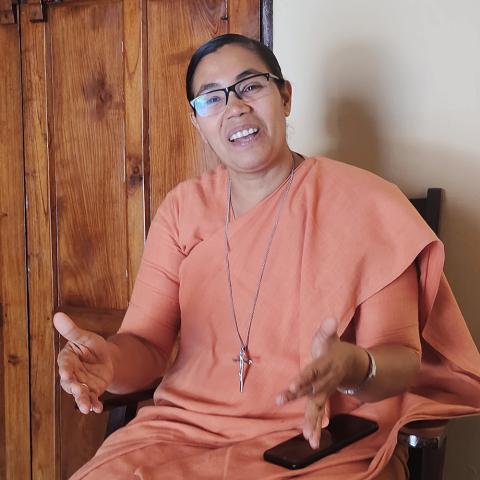
St. Joseph's Anglo-Indian School band performs at Kalolsavam, India's largest school cultural festival, in Kozhikode, Kerala. The team, prepared by Apostolic Carmel Sr. Maria Gracia, won an A grade in the competition. (Courtesy of Maria Gracia)
Talents are God-given gifts, and nurturing them is a divine job, says Sr. Maria Gracia of the Congregation of the Apostolic Carmel, who was among hundreds of women religious of different congregations preparing students for the latest version of India's annual interschool cultural festival, which began in 1956.
More than 14,000 students between the ages of 13 and 18 took part in the 61st Kerala Kalolsavam (Kerala Cultural Festival) held Jan. 3-7 in Kozhikode, a major town in the southwestern Indian state of Kerala.
The festival, the first after a two-year break because of the COVID-19 pandemic, had 239 events held on 24 stages. It not only showcases the students' cultural talents, but helps preserve and promote some dying art forms, including three exclusive to Kerala Christians.

Apostolic Carmel Sr. Maria Gracia (Thomas Scaria)
The Catholic Church manages nearly 3,000 schools in Kerala. Many are under the management of women religious, who play key roles in promoting students' talents.
Catholic schools were among the winners in several events at this year's festival. Two Catholic institutions secured the highest grades among more than 1,000 participating schools.
Gracia, 47, who has been associated with the festival for more than 20 years, spoke to Global Sisters Report about the women religious' efforts to promote art and culture among students in addition to education.
GSR: How did you feel about your Kozhikode district coming in first in the cultural competitions?
Gracia: We were excited when our district lifted the gold cup in the festival. We are proud of our students who fared well in the competitions. In my 22 years of experience of preparing students for the event, I feel gratified when our students perform well in the cultural competitions in addition to bringing good results in exams. As teachers and guides, we try hard to bring out their best potential. Our school, St. Joseph's Anglo-Indian School in Kozhikode, won all the events it participated in.

Students perform Chenda melam, a percussion art form, at Kalolsavam, India's largest school cultural festival, in Kozhikode, Kerala. (Thomas Scaria)
What is Kalolsavam? Please explain how it was started and its objectives.
The festival was initially called the Kerala State School Youth Festival. It is hosted by the Kerala government and features several art competitions for high school and higher secondary school students. The event is usually conducted during December and January. It is considered the biggest cultural event of Asia. Students get an opportunity to express their talents at the school level, subdistrict level, district level, and at the state level. When performers reach the state level, perfection reaches its zenith.
What are the church's contributions to the festival?
Catholic sisters prepare the students for all these events from the school level, spending several hours on these extracurricular activities. We serve students irrespective of their religious, social or cultural differences and help them foster a culture of harmonious living. Promoting talents among children boosts their self-esteem, confidence and a spirit of teamwork.

Students in traditional Kerala attire at Kalolsavam, India's largest school cultural festival, in Kozhikode, Kerala (Thomas Scaria)
How do you connect this mission to your religious vocation?
Our congregation believes in providing holistic formation of students: academics as well as extracurricular activities. Education will not be complete if we do not address students' full potential in sports, arts and cultural talents.
Over the years, I have observed that students involved in extracurricular activities grow with more confidence, self-esteem and discipline. We have integrated prayer and spirituality as a foundation for cultural shows. Talents are special gifts given by God, and nurturing them is surely a divine job.
What are the other advantages?
Every cultural art — music, dance or drama — is a tool that helps develop discipline and devotion, calmness and unity, and represent our customs and values as a society. When church-based schools engage in such activities, we are actually promoting Christian values and harmony. We identify and encourage academically weak students who can get grace marks in exams if they participate in the festival. One major advantage of the event is that students from various parts of Kerala with diverse backgrounds are able to mingle together, eat together and stay together, giving much scope for cultural integrity and unity.

A dancer rehearses at Kalolsavam, India's largest school cultural festival, in Kozhikode, Kerala. (Thomas Scaria)
You said hundreds of nuns from various congregations are involved in the festival. Does it not encourage unhealthy competition among the nuns and their students?
Yes. [She laughs.] We compete with sisters from our own congregation. Sometimes, some sisters do not speak to each other after the competition. We always compete with our own schools for various items, and it is part of the game. If the sisters are from other congregations, the reactions are a bit more visible. However, they are just momentary reactions. Ultimately, we are all one in Christ. I think competitions are good when we have a healthy mind.
How about the students and their parents? There were several disputes and appeals about the judgments. Some parents even clashed with the judges this year.
True, sometimes students are upset when the judgments go against them. Sometimes parents react violently. A few such incidents happen every year. The government has introduced the appeal system, where participants can challenge the results and a panel of judges reviews them and makes amendments, if any.
Because of such incidents, we prepare our students to accept failure gracefully. When we fail, someone else wins. The teachers who prepare the students for competitions should also prepare them for the results. We usually promote only group competitions as it promotes the value of working together and unity. Clashes normally happen for individual items, where every parent wants their child to win. Sometimes they try to influence the judges, too. These are unhealthy practices and should be condemned.
Advertisement
Of course! We have three art forms peculiar to the Oriental churches in Kerala, which were almost extinct. The festival has helped revive them: Margamkali [a dance form on the salvation story], Parichamuttukali [sword and shield dance], and Chavittu Natakam [dance drama on the life of Christ]. They are linked to the traditions of St. Thomas Christians of Kerala.
The original Christian art forms describe the arrival of the apostle St. Thomas in Kerala in the first century, the miracles he performed, the friendship and the hostility of the people he served, the churches and crosses he planted at various places, and the persecution he suffered. Most Catholic schools make it a point to depict these folk arts in the festival.

Students of a Catholic school rehearse Margamkali, a Christian art form depicting the origin and growth of Oriental churches in Kerala, southwestern India, during Kalolsavam, India's largest school cultural festival. (Courtesy of Maria Gracia)
Did you participate in the festival as a student?
I could not come up to the state-level meet but reached up to the district level in singing and dancing. Even if I did not qualify for the state festival, several of my students have made it to the top, and that's my satisfaction. I am part of our church choir, and I enjoy singing and teaching songs. I coach our students in the band, and they got the first grade.
What are some challenges you have faced in this field?
Christians are a minority community, but their schools are known for the best education and youth formation. Our students often win in competitions, which means others fail. This brings some frustration among other schools. Sometimes, judges are forced to recognize students from other schools to bring in some equality.
We have faced such discrimination many times, and we prepare our students to accept the verdict. We limit the number of contests our students participate in so that others can win, too.
Unhealthy competition among parents is another big challenge. This is mostly for the individual competitions. So, generally, we discourage individual competitions and give more importance to the group ones.






